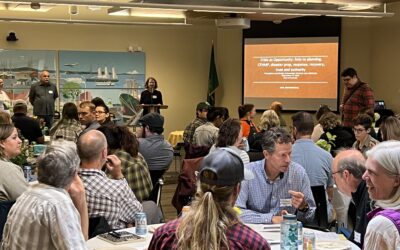Austin: Thank you so much for sharing today and allowing us to interview you. It’s really exciting to get to know you more and talk to you about your podcasts. When did you first start recording podcasts? What inspired you to create it?
Annika: Thanks for the question. I started recording podcasts in 2017 with the Outdoor Women Adventure (formerly Seattle Outdoor Sister) podcast. In 2020, I started NW Fish Passage. I love meeting new people, especially those passionate about the environment. I wanted to bring more diverse voices to environmental and outdoor podcasts, especially women from all backgrounds. The last four podcast episodes for NW Fish Passage have been interviews with amazing indigenous women.
Austin: That’s amazing! It feels like podcasting became especially popular following COVID. How did you get started with creating podcasts?
Annika: I started my own environmental consulting business (Fain Environmental, dba NW Fish Passage in 2015). I started PNW Cycling Sisters in 2016 and then the Outdoor Women Adventure Podcast in 2017. I initially did five-minute snippets about my adventures. After about ten of those, I started interviewing people who are passionate about the outdoors. I enjoyed the interview format much more and began interviewing people passionate about the environment on the NW Fish Passage podcast.
Austin: What do you hope listeners take away from your two podcasts?
Annika: I hope they learn something new. While my two podcasts may seem different, they both focus on people passionate about the environment and the outdoors. I want listeners to enjoy hearing people’s stories and how they got to where they are. I always ask my guests what they’re excited about in the coming years, which inspires me as well. On NW Fish Passage, I often ask for advice for young professionals and motivation for their work.
Austin: Do you have any particular favorite episodes or guests that really inspired you?
Annika: That’s a tough question because I learn something from every guest! But I’ll mention a few that stood out: Episode 7 & 20: April McEwan from American Rivers, discussing dam removal projects in Washington and Oregon. She’s the first guest I’ve interviewed twice. Episode 9: James Rasmussen, a Duwamish tribal member, sharing perspectives on the Duwamish River. Episode 16: Sea Potential with Savannah Smith and Ebony Wellborn, exposing BIPOC youth to marine environments. Episode 17: Deborah Lakenoff, Washington state representative, who advocates for salmon and the environment. Episode 24: Kayeloni Scott, a Nez Perce Tribe member, telling the story of salmon and her people.
Austin: You cover topics related to watershed health, ecosystem restoration, and environmental outreach. Are there any emerging issues or conversations you want to explore in future episodes?
Annika: Everyone I’ve interviewed has inspired me and provided a unique perspective. I want to explore ways to support the next generation of scientists and engineers. I’m also excited about interviewing more people from diverse backgrounds.
Austin: You’ve been involved in community restoration efforts for decades. How do you see outreach and education playing a role in environmental restoration efforts?
Annika: Outreach and education are critical. If people don’t understand why restoration efforts matter, they won’t support them. I’ve led tree plantings with Duwamish Alive, EarthCorps, and other groups. I also volunteered with programs like the Ocean Inquiry Program, which introduced underrepresented students to oceanography. These hands-on experiences are the best way to learn.
Austin: Are there any women in science, conservation, or environmental leadership who have inspired you?
Annika: Yes! Two major influences were Rachel Carson, whose book Silent Spring inspired me to pursue environmental work. As well as Sylvia Earle, a marine biologist and explorer, whose books about marine science are incredible. On a personal level, my friends’ mothers, who were science and math teachers, inspired me. I also draw inspiration from strong women like Frida Kahlo, Rosa Parks, Maya Angelou, Michelle Obama, and Ruth Bader Ginsburg.
Austin: What’s next for NW Fish Passage and Outdoor Women Adventures? Any exciting guests or topics coming up?
Annika: I recently interviewed Bethany Fackrell, a Snoqualmie Tribe member who participated in a Tribal Water Corps program. I’m excited to feature more Indigenous people, young professionals, and possibly organize a panel discussion on supporting the next generation of scientists and engineers.
Austin For those who want to support your work, where can they find your podcasts?
Annika: My website, nwfishpassage.com, has all the episodes. NW Fish Passage and Outdoor Women Adventures are available on Spotify, Apple Podcasts, and many other platforms. Reviews are especially important for smaller podcasts like mine to gain visibility, so I encourage listeners to subscribe, review, and spread the word!




